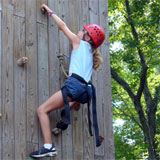 A large part of ensuring your child’s safety at camp is achieved by selecting a quality camp that is appropriate for you child’s age and maturity. Plus, most of what your child has already learned about being safe at school and in the community also applies to summer camp safety.
A large part of ensuring your child’s safety at camp is achieved by selecting a quality camp that is appropriate for you child’s age and maturity. Plus, most of what your child has already learned about being safe at school and in the community also applies to summer camp safety.
However, it’s still a good idea to review general safety tips with your children before they go to camp and also discuss any potential safety issues that may be unique to your child’s camp environment or activities.
If your child will be attending camp in an urban or suburban environment or will be attending field trips in these areas, refresh his memory about being safe near streets and cars. Also, emphasize the importance of following the counselors’ instructions and staying with the group.
If your child will be attending camp in a wilderness environment, review general wilderness safety tips. Instruct your child not to eat plants or berries or touch wild animals unless approved by the Camp Counselor. Remind your child to stay with the group.
If your child will be attending resident (overnight) camp, emphasize the importance of staying in his room or cabin from lights out until morning. No wandering around camp in the middle of the night.
If your child will be participating in water activities (swimming, canoeing, surfing, etc.), practice water safety techniques he should know. Show him how to properly wear and adjust a life jacket, how to stay afloat with minimal effort, how to escape a riptide, and other relevant skills. Most importantly reminder your child not to go into the water without permission and supervision.
Teach your child to use safety gear properly. An unfastened or poorly adjusted helmet or life jacket doesn’t offers a false sense of security.
If your child will be riding in vehicles, remind him to wear a seatbelt when available. However, many large buses aren’t equipped with seatbelts, so prepare your child for this exception.
Help your child understand appropriate adult behavior in a camp environment. Your child should not be alone with a camp counselor or other staff member. Trained counselors know this and will always ensure that other adults or campers are nearby. In some cases, a counselor may want to provide discipline or encouragement in private to avoid embarrassing a camper. However, the counselor and camper should remain within view, if not earshot, of other campers and counselors.
Keep in mind that physical contact is sometimes necessary and unavoidable in a camp environment. A counselor may need to verify that a rock climbing harness is properly fasted or help a camper mount a horse. Again the key is that the contact is necessary for the activity and takes place in full view of others. As in any situation, if your child feels uncomfortable with an adult’s or camper’s behavior, she should leave the situation and tell another adult.
If your child requires medication at camp, the counselors will probably store and administer it. However, review the medication requirements with your child, so he will be able to recognize a mistake in the frequency or amount.
Lastly, keep your cell phone on and with you while your children are at camp, so you can be reached easily and quickly.